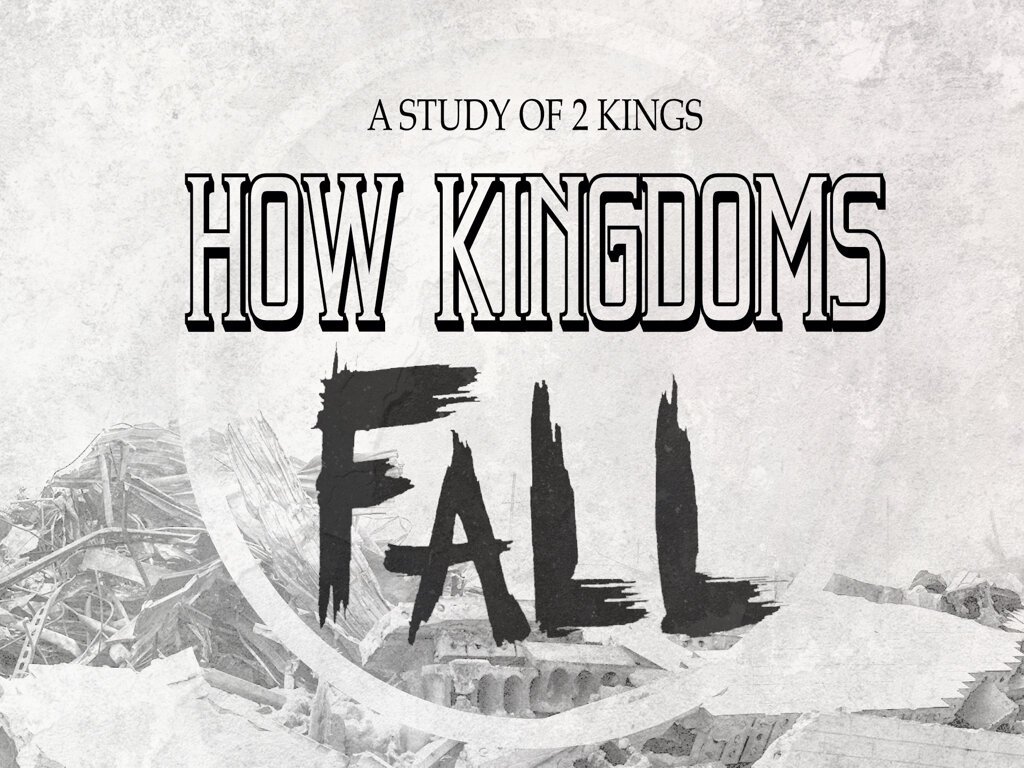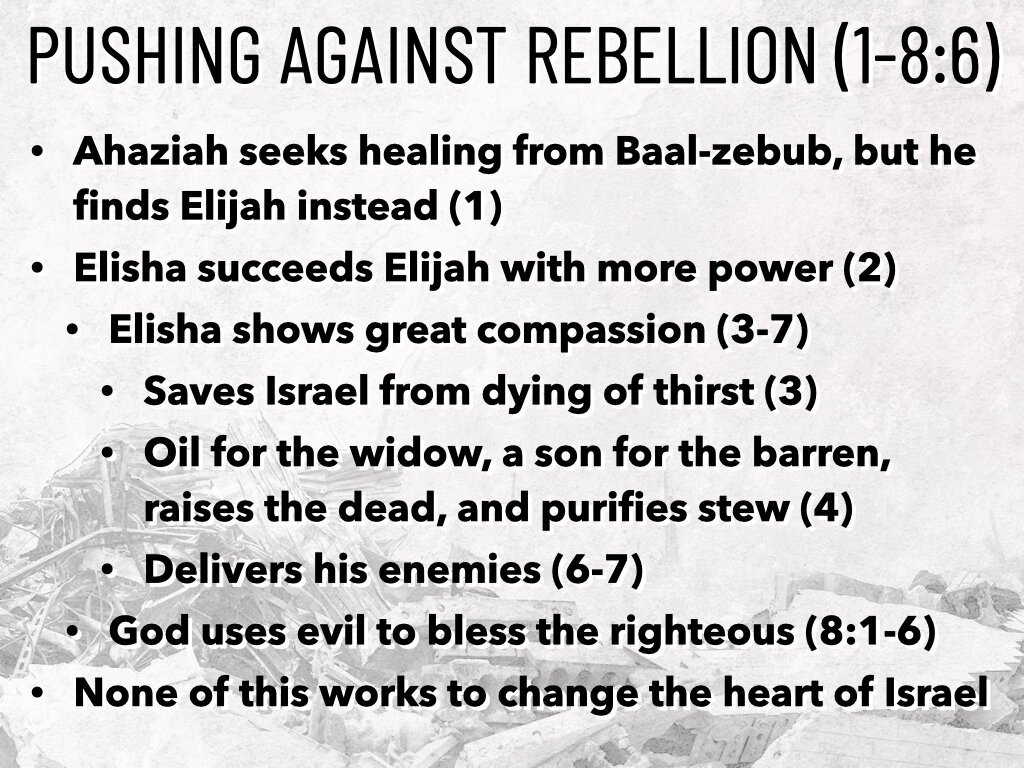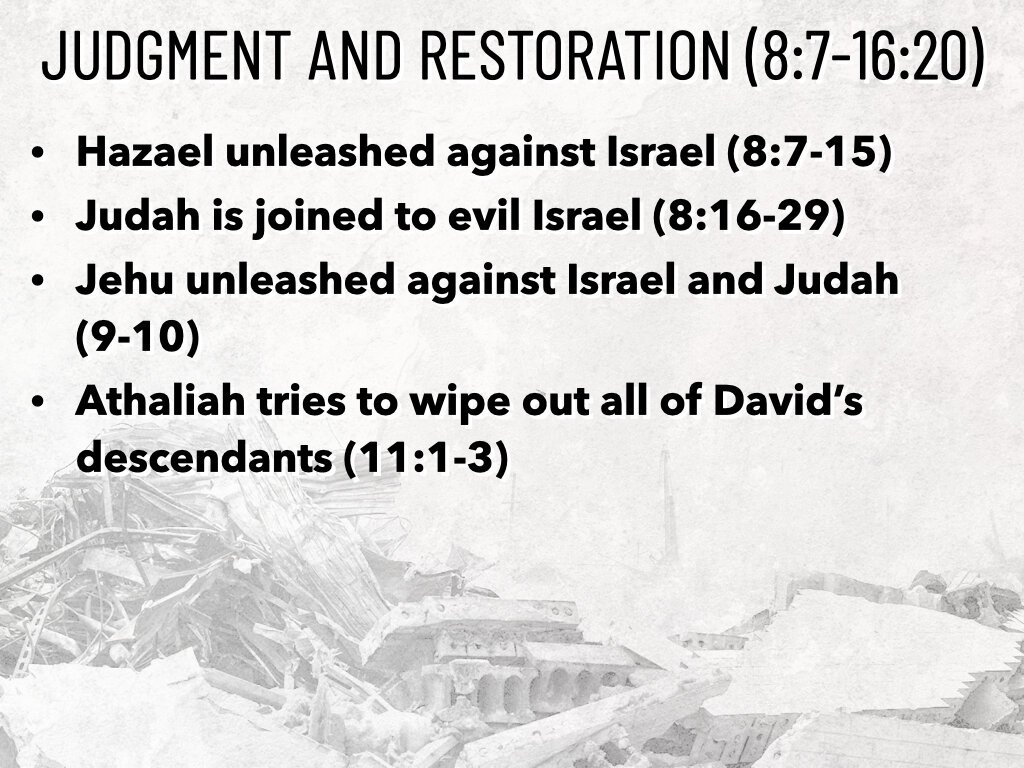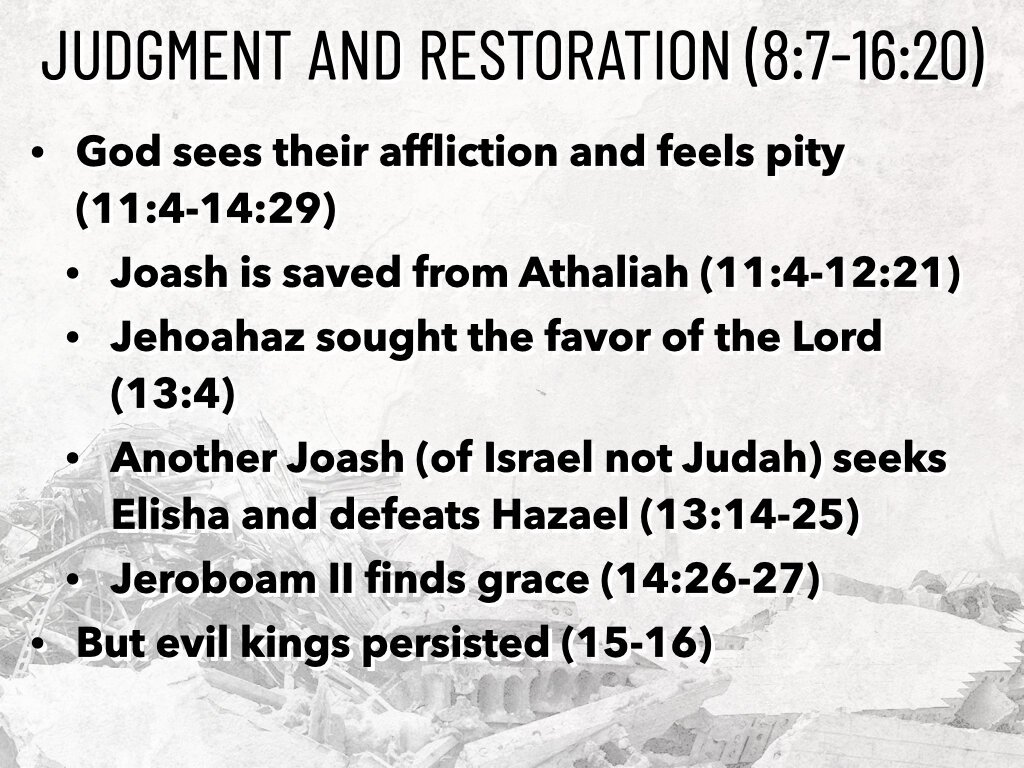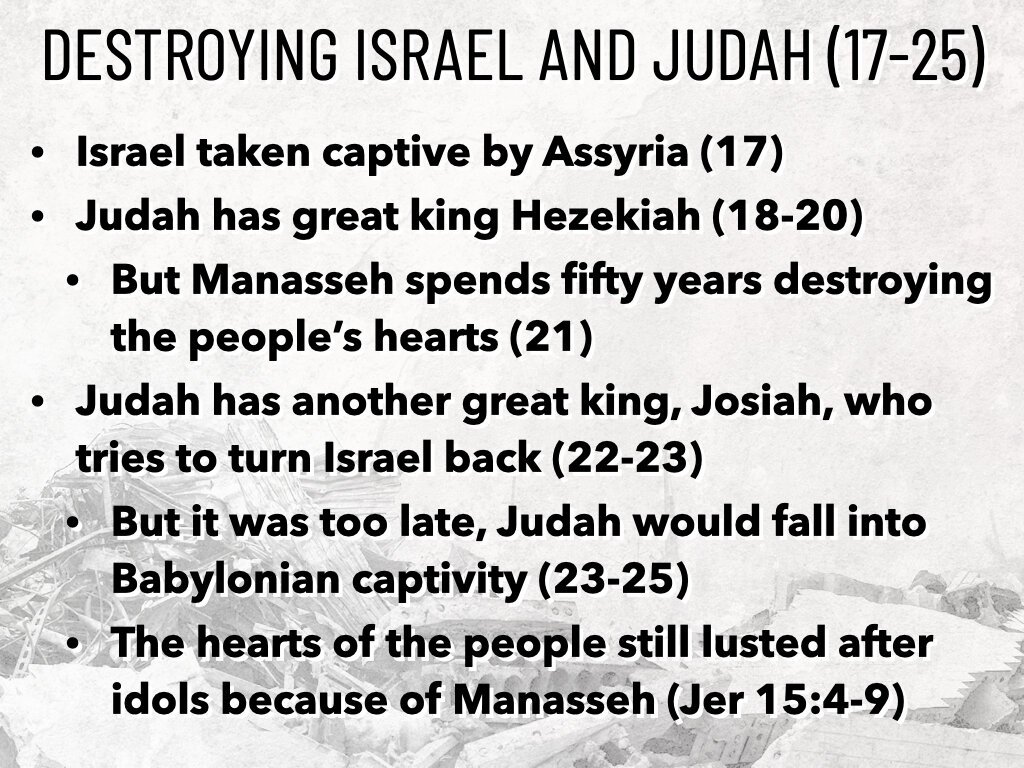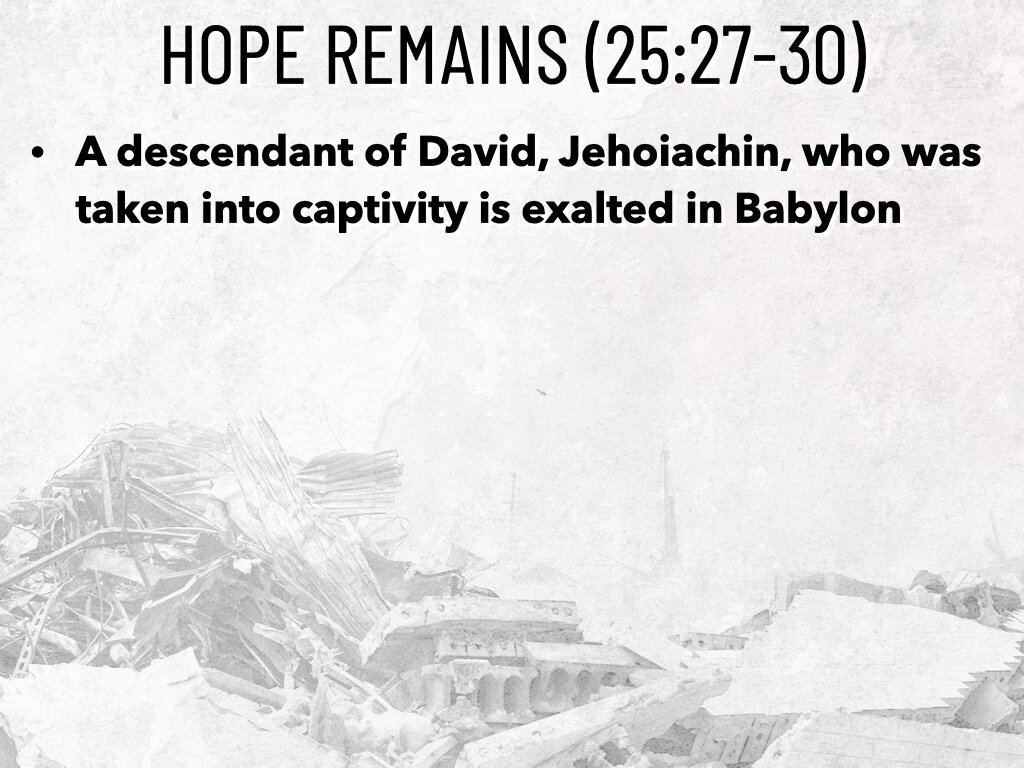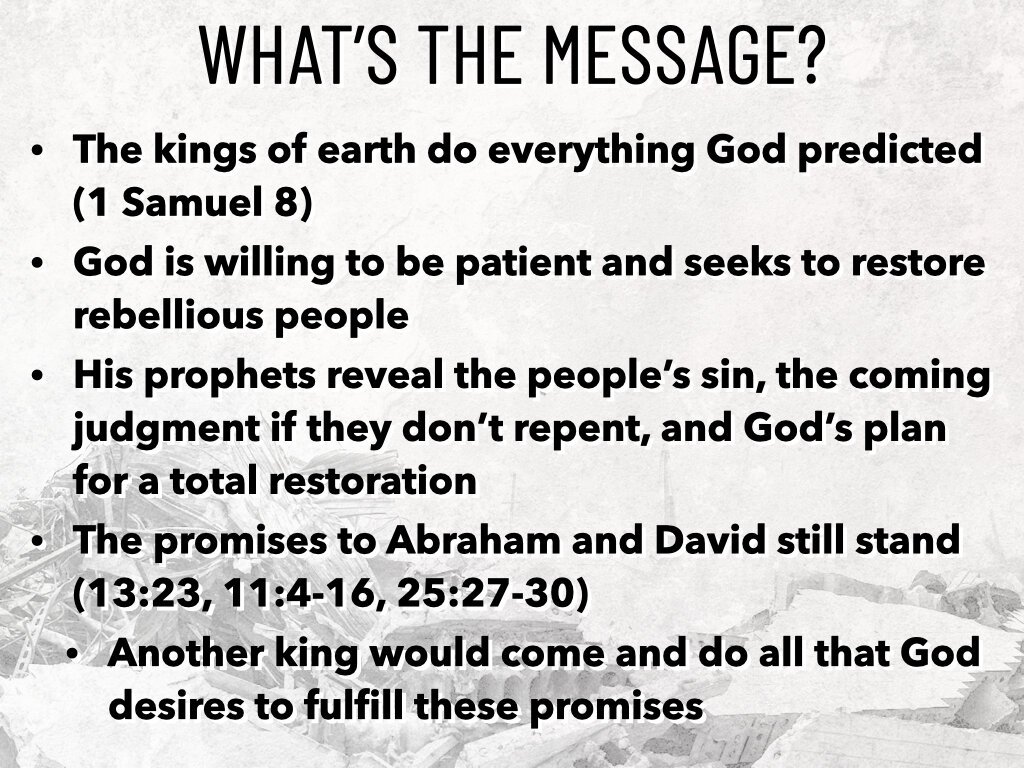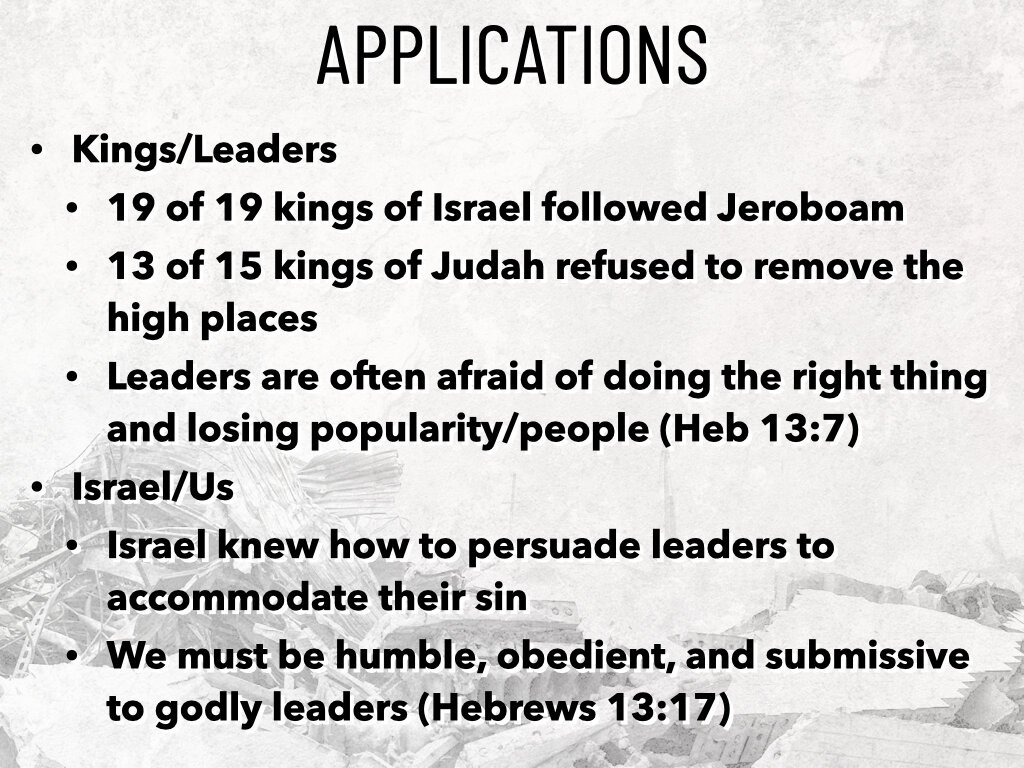How Kingdoms Fall (2 Kings)
In 1 Kings, we saw the gradual decline of the nation of Israel after Solomon pursued the idols of his wives. God tore the kingdom in two with ten tribes of the North serving king Jeroboam and the tribe of Judah serving king Rehoboam. As 1 Kings progressed, Jeroboam set up idol worship in Dan and Bethel for his kingdom. Then, all the northern kings followed that same path. On the other hand, the southern kingdom was able to turn everything around with Rehoboam's grandson Asa. He followed the path of David and sought God. Then, the book ended by zooming in on an evil king in the North named Ahab. We saw how God was working with Ahab through his prophet Elijah. God curses Ahab with a drought, but then he blesses him with military victory. At the end of the book, we see that Ahab does not learn anything from all of God's working. He rebels against God and is killed in a battle against Syria.
2 Kings is a continuation of 1 Kings. God continues to give us significant detail on the descendants of Ahab and his prophet Elijah. As we study 2 Kings, we realize that God was not focusing so much on Ahab in 1 Kings, as he was focusing on his prophet Elijah and his work. God wants us to pay close attention to the prophet Elijah because he will use Elijah as an example, as we have seen in the gospels.
These two books are some of the most depressing books in the Bible. They rank up there with Judges because no one does the will of God as they ought to. However, it is essential to note that these books have many supplements. The supplements to 1 and 2 Kings are Isaiah, Jeremiah, Lamentations, Ezekiel, Daniel, Hosea, Joel, Amos, Obadiah, Jonah, Micah, Nahum, Habakkuk, and Zephaniah. So if we read 1 and 2 Kings without considering these prophets, we might be tempted to say that God was very hands-off with Israel. Elijah, Elisha, Isaiah, and Jonah are all mentioned in these books to remind us that God gave the prophets to turn the people back to him.
Pushing Against Rebellion With Prophets
Chapter 1 of 2 Kings starts with the son of Ahab, Ahaziah, falling through latticework and wondering if he is going to die. So Ahaziah sends messengers to Baal-zebub, the god of Ekron, to determine if he will live or die. Elijah finds these messengers and asks them, "Is it because there is no God in Israel that you inquire of Baal-zebub, the god of Ekron?" Ahaziah will surely die. The messengers tell Ahaziah what Elijah said, and Ahaziah sends a captain of fifty men to get Elijah, but Elijah burns them up. So Ahaziah sends another fifty, but Elijah burns them up as well. Ahaziah sends another fifty. This time the captain falls on his knees and begs Elijah not to burn him up. So Elijah goes up to Ahaziah, and it doesn't change anything. Ahaziah still dies.
Elisha (2:1-8:6)
In Chapter 2, we learn about the end of Elijah. I say the end because Elijah does not die. He is taken up into heaven. The successor of Elijah is Elisha. In Chapter 2, we see that Elisha was given the Spirit of God that was on Elijah.
2 Kings 2:9--12 (ESV) --- 9 When they had crossed, Elijah said to Elisha, “Ask what I shall do for you, before I am taken from you.” And Elisha said, “Please let there be a double portion of your spirit on me.” 10 And he said, “You have asked a hard thing; yet, if you see me as I am being taken from you, it shall be so for you, but if you do not see me, it shall not be so.” 11 And as they still went on and talked, behold, chariots of fire and horses of fire separated the two of them. And Elijah went up by a whirlwind into heaven. 12 And Elisha saw it and he cried, “My father, my father! The chariots of Israel and its horsemen!” And he saw him no more. Then he took hold of his own clothes and tore them in two pieces.
After this event, Elisha begins to work miracles, just like Elijah did. But Elisha seems to do even more wonders. If you remember our study of 1 Kings 19, God told Elijah that he would anoint Hazael to be king of Syria, Jehu to be king of Israel, and Elisha to be his successor. These three men would bring about the judgment that God promised. So we expect Elisha to use his power to destroy all of those who are evil in Israel. Sure, in Chapter 2, he kills the young men in Bethel by calling a bear to tear them to pieces, but that probably has to do with the idol worship they were promoting. Remember, Bethel is the city where Jeroboam set up one of the golden calves. So these young men were worshipping Baal and mocking God's prophet. However, Elisha is not really harsh or bringing much judgment at all. Instead, he is extremely compassionate and helpful to Israel. Elisha assists Israel, Judah, and Egypt against Moab in Chapter 3. He saves a poor widow and helps a Shunammite woman in Chapter 4. He gives her a son and raises her son from the dead after he died.
In Chapters 5-7, we see Elisha doing miracles for his enemies. He heals the leprous commander of a Syrian army. He has an opportunity to kill a massive army of Syrians, but instead, he makes them blind, leads them to the king of Israel so they can feast, and lets them go home. At the end of Chapters 6 and 7, Israel tries to kill Elisha because they are going through a famine and being attacked by Syria. Instead of cursing Israel, Elisha promises them food. God scares away the Syrians and gives Israel the plunder.
Do you think Israel learns from their mistakes? Do you think they put away their idols after all of this was done for them through the prophet Elisha? No. They continued in the sins of Jeroboam.
Judgment (8:7-11:1)
In Chapter 8, we discover that God was still able to use this wicked nation to help the faithful. Then, we see that God sets up the assassins he promised to Elijah. Hazael becomes king of Syria to punish Israel. Jehu becomes king of Israel by taking out all of Ahab's descendants and the evil queen Jezebel. Then, a queen mother named Athaliah kills almost all of the descendants of David. She is a descendant of Ahab, who becomes queen over Judah through intermarriage. Jehu killed her son, and she turns around and kills all of the other descendants of David except for one little boy. All of these assassins were evil, but God uses them to punish his people, hoping that they would return to him.
Attempting Restoration (11-16)
This becomes overwhelmingly apparent in Chapters 11 through 14. Athaliah was overthrown, and a descendant of David restores Israel to worship the Lord. But Israel keeps pursuing the ways of Jeroboam through their kings. In Chapter 13, we read about the son of Jehu seeking the Lord because of his punishment at Hazael's hands, and the Lord listened to his cry. But he doesn't completely turn back to the word of God. His son also wept at Elisha's deathbed, but he was just as evil as his father. God gives him some victory, but not a total victory. At the end of Chapter 14, we read about another Jeroboam reigning over Israel. Apparently, God tried to give Israel a break from the affliction that they had endured for many years at the hands of Syria and Assyria. He blessed them and wanted to restore them to see if they would repent. But they refused.
In Chapters 15 through 16, everything starts to spiral out of control. Every king in Israel does evil. Judah has a king that does more evil than those in Israel. Ahaz, the king of Judah, offers his child as a sacrifice to Molech. He also brought all kinds of idolatrous worship into the temple and Jerusalem.
Destroying Israel and Judah (17-25)
The rest of this book shows how God put an end to all of the madness. In Chapter 17, God used the Assyrians to judge the northern kingdom. He sent them away and dispersed them in the Assyrian captivity.
In Chapter 18, Hezekiah is described as one of the greatest kings Judah has ever seen. He destroys all the high places and establishes worship in Jerusalem according to the law. As a result, God was with him and gave him great success. It was said that no one was wiser than Solomon, but of Hezekiah, no one trusted the Lord like him. However, at the end of his life, he became proud (Chapter 20). He showed all of his wealth to the king of Babylon. So God, through the prophet Isaiah, promises to judge Judah by carrying it away in Babylonian captivity.
In Chapter 19, we read that Hezekiah's son was Manasseh. He was the evilest king Judah had ever seen. He offered his son in sacrifice, murdered innocent people, and he also turned all of Judah's heart to worship idols.
In Chapters 22 and 23, we read about Manasseh's grandson Josiah becoming king at eight years old. He was another amazing king. He instituted all kinds of reforms and got rid of the idol worship in the land. It is said about Josiah that, "Before him there was no king like him, who turned to the Lord with all his heart and with all his soul and with all his might, according to the Law of Moses, nor did any like him arise after him."
But God was still going to judge Judah. The king's righteousness was not enough to atone for the people's perpetual sin. After Josiah died, Babylon came in and carried Judah into Babylonian captivity in Chapters 24-25.
Hope Remains (25:27-30)
This seems like such a sad story. But the book doesn't end with destruction. We read that in the middle of the Babylonian exile, the last king of Judah (and descendant of David) was freed from prison and allowed to feast every day at the king of Babylon's table. This is an odd ending that makes us believe that God has more in store.
Of course, we have already studied the books of Esther, Ezra, and Nehemiah. We know that God will bring the people back to Jerusalem and prepare them for a Messiah like David, who will reign forever.
What's The Message?
In the book of 1 Kings, God reveals his willingness to be patient and refrain from destroying the people. They have been evil from the very beginning. Israel rebelled in the wilderness, Israel rebelled under the judges, and now they have rebelled under the kings. These kings have done all that God told Israel they would do back in 1 Samuel 8. They have completely turned away from God's laws and afflicted the people. God warned Israel that this would happen, and he told them that he would not hear their cries because they have rebelled against God. But when this happens, God pulls out all the stops. He gives the kings every reason to turn away from their wickedness and follow his laws. He sends discipline in the form of famine, wars, and pestilence along with prophet after prophet to turn their hearts back to David's heart, but they would not listen. A kingdom like the kingdoms of the earth will never work because men fall short of God's glory.
Unfortunately, reading 1 & 2 Kings without reading all of the prophets is only reading part of the story. We need to understand the minor and major prophets to get a taste of God's perspective during all of this. Prophets like Amos and Hosea show how betrayed God feels after being abandoned for idols. They also show God's plans for something better. The only hint of something better in this book is that he keeps the line of David intact.
The prophets will reveal his plan to set up a Messiah who would serve as the prophet, priest, and king over all Israel. He will be like Elisha and David, but he will not be like these prophets, priests, and kings because he will do everything God wants. He will successfully fulfill all of the promises made by God and rule over an eternal kingdom that covers the whole world.
Application
Kings/Leaders
Both of these books have an application for leaders. Notice how every king of Israel, nineteen total from nine different lines, continued in the sins of Jeroboam, which he caused Israel to sin. Why is this book so emphatic about this? Also, thirteen kings of Judah failed to remove the high places where the people of Israel worshipped foreign gods. The only kings who removed the high places were Hezekiah and Josiah, and they were only able to remove them for a short time. The very next king would bring idol worship right back. What does this tell us about the kings? They were afraid to lose the people.
All of the kings, except Hezekiah and Josiah, were unwilling to take away the idol worship from the people because Israel loved idols. It is incredible how much they had constructed throughout the country. They were everywhere! At the end of Judah (Chapter 23), we see Josiah tearing down all of these high places, and we get a sense of how much idolatry had been going on. These kings knew that the people were stubborn and rebellious, not humble and submissive. So most were not willing to be correct the people for fear of rebellion. What a message for those who would be elders! Correction may not make us popular among the congregation, but it is absolutely essential for the well being of the people.
Israel/Us
What about those who are not leaders? Can we gain an application from that? The people wanted idols so much that they were influencing their leaders to approve of their idols. Maybe they thought, "God hasn't judged us for our sins, so it's no big deal." That ended up not being the case. All of Israel was judged for their sins. We are encouraged throughout this book not to take the kindness of God for granted. We must listen and heed God's word without entirely relying on our leaders to tell us what is right and wrong.
Hebrews 13:7--8 (ESV) --- 7 Remember your leaders, those who spoke to you the word of God. Consider the outcome of their way of life, and imitate their faith. 8 Jesus Christ is the same yesterday and today and forever.
The Hebrew writer reminds us to look at our leaders and imitate their faith. We can look to Jesus, our king, and see the author and perfector of our faith.
Hebrews 13:17 (ESV) --- 17 Obey your leaders and submit to them, for they are keeping watch over your souls, as those who will have to give an account. Let them do this with joy and not with groaning, for that would be of no advantage to you.
We must also live in submission to those who become elders because they are trying to help us overcome spiritual pitfalls. We must not act like Israel and be full of groaning and disputing. Instead, we must have a submissive attitude. Jesus is our king, but shepherds are given the responsibility of looking out for our souls. Imagine the difficulty of telling people that they have to stop visiting the cult prostitutes and high places of worshipping idols. Elders have to make changes and set things in order so that Jesus is our king. They have to watch out for the things that might be damaging to our souls. They also have to lead the congregation in faith so that everyone plays a part in the mission that God has given us to do.
Conclusion
As we study this book, we are blown away by the unfaithfulness of Israel and their kings. But as we consider the magnitude of their sins, we understand the patience and longsuffering of our God. He gave them every opportunity to repent and to turn back to him. God offers that opportunity to you as well. At some point, God has to say, "Enough is enough." Don't take his kindness for granted. Repent today and submit to the will of God.

